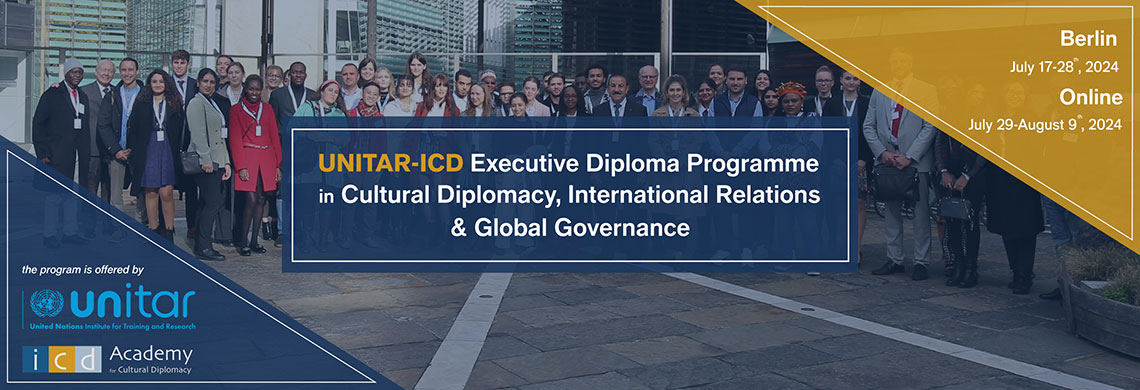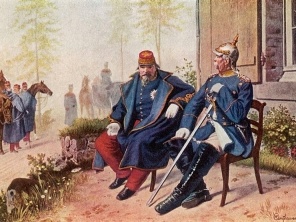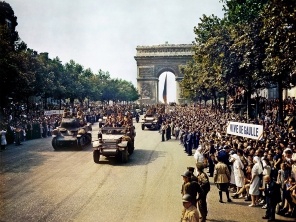The importance of cultural diplomacy in turbulent times
Arab News, April 09th, 2021
The importance of cultural diplomacy in turbulent times

On July 24, 2008, students and friends of the Academy for Cultural Diplomacy in Berlin went with thousands of other enthusiastic Berliners to watch Barack Obama make his memorable 2008 election speech in the city1.
On that summer day, the events of the Sept. 11 attacks and the era of President George W. Bush’s war on terror seemed very far away. Those who witnessed the speech were buoyed by a sense of positivity and an expectation that improved relations between states, groups and individuals would follow. In those days we found ourselves caught up in the positive energy of the process of globalization, the EU was in a strong and growing position, the world was still impressed by the strengthening growth of China, and even the financial crisis of that year looked solvable. Many people shared a belief that ahead of us lay a glowing future2.
For the Academy for Cultural Diplomacy in particular, the election of an African
American as US president, soon after his
speech in Berlin, symbolized the optimism
of the time. It seemed to offer proof that
the world was adapting to, and accepting,
diversity and increasingly embracing
elements of cultural understanding, along
with greater dialogue between states
and peoples.
During the early days of the Obama administration, many individuals and institutions were under the impression that, very soon, cultural diplomacy would become the common currency for international relations and for citizens around the world, and that the work of the Academy for Cultural Diplomacy would soon no longer be necessary3.
Regrettably, the positive feeling and this assumption turned out to be wrong. Only 12 years have passed since the inauguration of President Obama, and we now find ourselves facing a very challenging global situation, with countless pressing challenges. It is difficult to know which to prioritize as the greatest threat: the global health crisis, the lack of international cooperation to cope with environmental issues, or the rapid deterioration of relations between the superpowers4.
The winds of war can already be sensed stirring the air around us, while at the same time the world is witnessing unimaginable levels of cruelty from terrorist groups such as Daesh and Boko Haram, among others. One can debate which is more dangerous: the COVID-19 pandemic that continues to spread and has already claimed close to 3 million lives globally, the environmental changes that are causing disasters around the world, or the risk that the new cold war between the superpowers could deteriorate into the real thing5.
When one analyzes the history of wars in Europe over the past two centuries it is instructive to consider the ramifications of the Franco-Prussian war 150 years ago. It led to the defeat of Napoleon III and the end of the French Empire, and paved the way for the unification of the German states and the rise of the German Empire.
The war effectively ended with the Prussian victory at the battle of Sedan in September 1870. France was left in a disastrous situation, its territory occupied and facing the burden of heavy reparations. The defeat, accompanied by the loss of the Alsace- Lorraine region, was a devastating blow to French pride.
In the decades that followed, France did not forget this humiliation. In 1914, this was one of the factors that contributed to the willingness and the motivation of the French people to resist German aggression during the First World War.
After the victory over Germany in 1918, it was then the turn of the French government to annex territories from Germany and impose heavy compensation demands on the German people. These factors in turn paved the way for the rise of Adolf Hitler and the Nazis in Germany and, ultimately, the Second World War6.
Hypothetically, had Napoleon III — as an alternative, or in addition, to the hard power he exercised — practiced soft power and cultural diplomacy during the years leading up to the Franco-Prussian war, he might have faced a less harsh outcome in defeat, sparing the French nation much suffering. If cultural-diplomacy strategies had been applied and maintained consistently from the very beginning of the dispute, it might also have spared the suffering of the German people after their defeat in the First World War and decreased the motivation that led to the rise of the Nazis and the tragedy of the Second World War.
We cannot, of course, be certain that the use of cultural diplomacy would have prevented those events, but most certainly it could have contributed to better outcomes. Indian Prime Minister Narendra Modi expressed the principle very clearly in a 2019 speech he gave in South Korea: “Replace hate with harmony, destruction with development, and transform the landscape of violence and vendetta into a postcard for peace7.”
Employing the same rationale, we can travel even further back, 80 years before the Battle of Sedan, when the world was astonished to witness the overthrow of monarchy and aristocracy by the French Revolution. In addition to financial and democratic inequalities, the primary causes of the uprising included factors such as arrogance, humiliation, revenge and the refusal of the authorities to understand and develop closer ties with their people8.
The famous, if possibly apocryphal, response of Marie-Antoinette, the last queen of France, to the appeals of her citizens for bread — “Let them eat cake9” — symbolizes the failure of domestic diplomacy that was at the heart of the motivation for the French Revolution. If Louis XVI had possessed the wisdom to exercise cultural diplomacy, he might not have lost his throne — or his head. In the Cold War era that began after the Second World War and ended in the early 1990s, the major powers had already started to recognize the value of cultural diplomacy. Again, we cannot state categorically that its use prevented an escalation of the Cold War, but it doubtlessly contributed to its end10. Throughout history, one can easily identify cycles of war and peace repeating themselves and, just as one needs to be ill to fully appreciate good health, it seems, sad to say, that the human race needs to experience war to appreciate the benefits of peace. The effect of the strategies and policies of cultural diplomacy is impossible to measure and to anticipate, but its contribution to improving relations, opinions and image is enormous and crucial11.
It is simply human nature that people will not take hard revenge against others who have been kind to them. They might still take their land and money within the framework of a conflict, but the motivation for revenge is much diminished in cases where cultural diplomacy has been practiced and experienced.
It follows, therefore, that its use could have spared the lives of many people in past centuries and saved the expenditure of untold amounts of national resources. Despite the fact that the strategies of cultural diplomacy are much cheaper than their hard-power alternatives, in most cases they are ignored or not maintained in a consistent way. And if cultural diplomacy is not maintained for an extended period of time, new generations emerge into a different world devoid of it, which creates a more dangerous environment and more precarious relations.
Napoleon III and Bismarck - meet in Donchery after the lost of Second French Empire to Prussia and other German States in battle of Sedan in 1870.
Cultural diplomacy must, therefore, always be a part of the agenda and implemented by all at the macro and micro levels, from national governments and global-governance institutions to civil-society organizations, corporations, groups and even families. One must never forget the inefficiency and harm of the alternative to cultural diplomacy. The challenges facing the world of today have already become dangerous. After the genocide of the Jewish people during the Second World War the world said “never again.” However, crimes against humanity are happening in many places right now — the crises affecting the Rohingya and Uighur peoples are just two examples12. Extreme poverty, including lack of access to food, medicine and housing, is the reality for many people around the world13 . Climatechange disasters are pushing more people into poverty, and the lack of international cooperation over climate change is threatening to tip the world past the point of no return14.
Large and small conflicts are flaring up and becoming the norm. Disputes that range from the Russian invasion of Georgia and Ukraine, following allegations of Western meddling, to China’s interference in Hong Kong and its threats against Taiwan, with the increasing use of ever-stronger language, challenge a world peace that is being tested and threatened by the day15. The Iranian interference and promotion of aggressive disputes in other countries, such as the war in Yemen. The wars in Libya, Syria and Nagorno-Karabakh. The crises engulfing many states in Africa, such as Mozambique, Ethiopia, Uganda, Nigeria, Niger and Congo. The coup d’etat in Myanmar.
The proclamation of the German Empire - took place in January 1871 after the joint victory of the German states in the Franco-Prussian War.
All of these flashpoints are symbols of an era characterized by a lack of harmony and escalating disputes. At the same time, in the free world and Western societies the dialogue between political groups is deteriorating and becoming more violent in nature16. Cultural diplomacy alone cannot solve these issues; however, in them the results of the absence of cultural diplomacy can easily be seen. Definitely, disputes would be less extreme and less drawn-out if cultural diplomacy was being more widely practiced and implemented17.
Cultural diplomacy is much more important now, against the backdrop of these turbulent times, as it currently represents the only remedy we have to relieve the growing symptoms of violence and disputes between peoples, nations and groups around the world.
Cultural diplomacy is much more important at times such as these than it is in times of peace — there is little point offering medicine to a healthy person. But when our relationships are sick, cultural diplomacy can help to slow a deterioration of conditions until real solutions can be found18. What tools do we have now to halt, for example, the deterioration in relations between China and the US? More nuclear weapons will not help. More sanctions will not help — quite the reverse; such policies will just inspire both sides to prepare for war. However, displays of mutual respect between cultures, alongside continuing dialogue including the use of cultural diplomacy, can only help to ease the tensions that can result in conflict.
Signing the Treaty of Versailles - was the most important of the peace treaties, which was signed in June 28th, 1919 and brought World War I to an end.
Now is the time to search and reach for successful models of cultural engagement and cultural openness to halt the deterioration of relations. The international community should look to the example of a country that is using cultural diplomacy in a modern way to spare the world all kinds of horrors, and learn from it.
Germany invaded France in 1871 and took the world into two global wars, but now serves as a model for the successful use of cultural diplomacy. The nation exports cultural diplomacy in every policy and strategy, and for decades has dedicated a major portion of the governmental budget to support this.
It is ironic that at the end, after all Germany, yes, the German Chancellor Angela Merkel, was the main campaigner to demonstrate cultural openness and allow in 2015 the entrance of Millions of refugees to Germany and Europe while risking of cultural conflicts, losing her career and political conflicts with other members of the EU who rejected these policies.
“Wir schaffen das,” Merkel said at the time, meaning “we can make it.” One can only imagine what might have happened to those Syrian refugees had Germany closed its borders to them. The world should cherish the country’s heroic action and adopt similar approaches to counter the challenges of today19.
The Liberation of Paris - took place during World War II from August 19-25th, 1944 when the German garrison surrendered the French Capital.
Now is the time to return to the spirit of an era, during the Cold War, when the American government tried to alter international perceptions of the US by sending “jazz ambassadors” out into the world20. Now is the time to reflect on an era when, for more than four decades, US cinema was utilized as a cultural diplomacy initiative to do battle with international communism21.
It does not take much effort to recognize and understand the immense power of cultural diplomacy. Simply watch, for example, American filmmaker Oliver Stone’s 2017 television documentary series “The Putin Interviews” — and in particular a scene in which Stone and the Russian president together watch the film “Dr. Strangelove,” Stanley Kubrick’s acclaimed 1964 black comedy that satirizes Cold War fears of nuclear war22.
Notes
1. The Washington Post (The Washington
Post, 2013) Obama’s 2008 speech in Berlin.
https://www.washingtonpost.com/
video/politics/obamas-2008-speech-inberlin/
2013/06/18/0ace453e-d85f-11e2-a016-
92547bf094cc_video.html
2. The World Bank (The World Bank, N.d)
GDP Growth (annual %) - China https://data.
worldbank.org/indicator/NY.GDP.MKTP.
KD.ZG?locations=CN
3. Staff. (Bundeszentrale für politische Bildung
and Institute for Cultural Diplomacy, 2008)
How does America Vote? https://www.bpb.de/
presse/50349/wie-waehlt-amerika
4. World Health Organization (WHO, N.d)
Coronavirus (COVID-19) Dashboard. https://
covid19.who.int/
5. Christensen, J. (Foreign Affairs, 2021) There Will
Not Be a New Cold War The Limits of U.S.-Chinese
Competition. https://www.foreignaffairs.com/
articles/united-states/2021-03-24/there-will-notbe-
new-cold-war
6. Berghahn, V.R., (Princeton University Press,
2005) Europe in the Era of Two World Wars: From
Militarism and Genocide to Civil Society,
1900-1950.
7. Staff. (The Economic Times, 2019) PM Modi
receives Seoul Peace Prize for 2018 https://
economictimes.indiatimes.com/news/politicsand-
nation/pm-modi-receives-seoul-peace-prizefor-
2018/articleshow/68108358.cms?from=mdr
8. De Tocqueville, A., (Michel Lévy Frères, 1866)
L’Ancien Régime et la Révolution, 7th ed. (The Old
Regime and the Revolution).
9. Staff. (History, 2018) Did Marie-Antoinette really
say “Let them eat cake”? https://www.history.
com/news/did-marie-antoinette-really-say-letthem-
eat-cake
10. Nye Jr., J.S., (Basic Books, 1990) Bound to Lead:
The Changing Nature of American Power.
11. Gienow-Hecht, J., & Donfried, M. (Berghahn
Books, 2010) Searching for a Cultural
Diplomacy (eds.)
12. For more information, please visit: Genocide
Watch https://www.genocidewatch.com/
13. United Nations Development Program (United
Nations, 2020) The 2020 Global Multidimensional
Poverty Index (MPI) http://hdr.undp.org/en/
2020-MPI
14. NASA (NASA, N.d) Climate Change: How Do We
Know? https://climate.nasa.gov/evidence/
15. Staff. (The Week, 2018) Is the West interfering
in Russia’s election? https://www.theweek.
co.uk/91689/is-the-west-interfering-inrussia-
s-election
16. Berlin, L.C., & Fetzer, A. (John Benjamins, 2012)
Dialogue in politics (eds.)
17. The Center for Cultural Diplomacy Studies (CBS
News, 2011) Michael Chertoff & Mark Donfried
talk to CBS NEWS about Soft Power https://www.
youtube.com/watch?v=sGu3CIWRorE
18. Center for Cultural Diplomacy Studies (Center
for Cultural Diplomacy Studies, N.d) Historical
Acts of Cultural Diplomacy https://www.
culturaldiplomacy.org/academy/index.php?en_
historical-acts-of-cd
19. Winig, L. (Harvard Kennedy School, 2016)
Wir Schaffen Das: Angela Merkel and Germany’s
Response to the Refugee Crisis in Europe https://
case.hks.harvard.edu/wir-schaffen-das-angelamerkel-
and-germanys-response-to-the-refugeecrisis-
in-europe/
20. Perrigo, B. (Time, 2017) How the US Used
Jazz as a Cold War Secret Weapon https://time.
com/5056351/cold-war-jazz-ambassadors/
21. Sorlin, P. (Film History, 1998). The Cinema:
American Weapon for the Cold War.
22. Heil, E. (The Washington Post, 2017)
Oliver Stone and President Putin watched
‘Dr. Strangelove’ together https://www.
washingtonpost.com/news/reliable-source/
wp/2017/05/01/oliver-stone-and-vladimir-putinwatched-
dr-strangelove-together/





























































